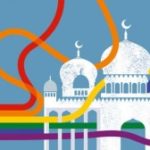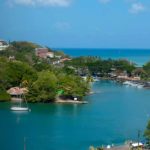By Richard Ammon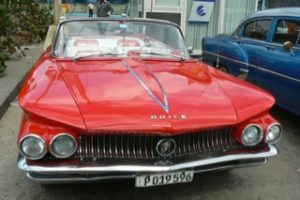
Globalgayz.com
Summer 2016
Also see:
Gay Cuba Stories
Gay Cuba News & Reports 1997 to present
Gay Cuba Photo Galleries
My second visit to Cuba was in 2016 to visit old friends and meet new ones. The appearance of Havana is essentially the same as my previous visit ten years ago. There has been little industrial or social progress in this socialist country mostly because of inept government control of society and commerce. It is a state stuck in old cumbersome and complex Soviet systems with state control of nearly everything. For example there are two currencies, one for tourists and one for locals with different values of each which has led to a thriving black market. In addition there are two kinds of grocery stores and restaurants (paladors), again one for moneyed folks and one for poorer locals. Infrastructure is in disrepair, many old colonial buildin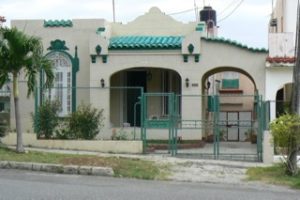 gs are in shabby condition with a few nicely restored; same with the old cars patched up with Russian diesel engines and others–mostly convertibles (photo above)–restored for visitor tours. This visit (entering Cuba visa-free via Cancun) I stayed in a ‘casa particular’ a private middle-class gay-friendly residence with a guest room (photo left), owned by a retired engineer and his wife, Roberto and Maria. They made me feel at home and offered a hearty breakfast each day.
gs are in shabby condition with a few nicely restored; same with the old cars patched up with Russian diesel engines and others–mostly convertibles (photo above)–restored for visitor tours. This visit (entering Cuba visa-free via Cancun) I stayed in a ‘casa particular’ a private middle-class gay-friendly residence with a guest room (photo left), owned by a retired engineer and his wife, Roberto and Maria. They made me feel at home and offered a hearty breakfast each day.
CENESEX
One important sign of progress is found in a lovely residential mansion at 460 Calle 10 in central Havana. (photo right) Here is the home of CENESEX (Centro Nacional de Educación Sexual) a health, educational, human rights organization headed by Mariela Castro (non-gay daughter of the president Raoul Castro, Fidel’s younger brother). The organization is also well known for advocating on behalf of LGBT-gay issues in Cuba.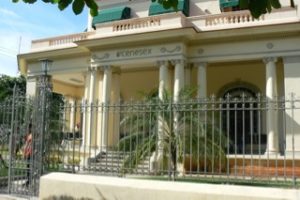
My visit to CENESEX including an interview with gay staff member Cesar who gladly described the many functions of the organization, from social gatherings, international conferences to educational forums for teachers and police about human rights and LGBT citizens. It offers legal advice and judicial training for professionals.
A recent conference focused on exploitation of children with UN personnel from the Youth and Gender Partnership of the UN Population Fund (UNFPA). This event reveals that CENESEX’s work is not just local but international. Their website lists more than one hundred various social and scientific functions and services including HIV testing and counseling by professionals. (In 2008 the government health service began to offer free gender reassignment surgery as part of their services.) So it’s no surprise that gay folks find the headquarters a welcoming place to visit.
This is unique in Cuba’s history. Before CENESEX there was no legal public place where LGBT Cubans could find comfort and safety. Mariela Castro, with her name and influential status, changed that. Previously Cuba had strict laws that criminalized homosexuality and targeted gay men for harassment. The Castro revolution takeover happened on January first 1959 but it took another thirty years before private, non-commercial consensual sexual intimacy between same-sex adults over 16 was made totally legal, in 1989. Arrests were made but many were not since low-paid police could be bribed.
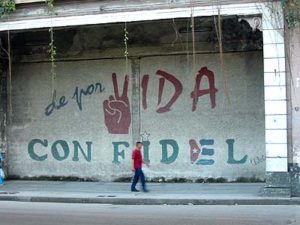 In his autobiography My Life, Fidel Castro “criticized the machismo culture of Cuba and urged acceptance of homosexuality. He made several speeches to the public regarding discrimination against homosexuals. He felt the negative treatment of gays in Cuba was the result of the country’s hostile pre-revolutionary homophobic attitudes.” (Wiki) Since then the anti-gay religious and social climate has softened over the decades to moderate disapproval today.
In his autobiography My Life, Fidel Castro “criticized the machismo culture of Cuba and urged acceptance of homosexuality. He made several speeches to the public regarding discrimination against homosexuals. He felt the negative treatment of gays in Cuba was the result of the country’s hostile pre-revolutionary homophobic attitudes.” (Wiki) Since then the anti-gay religious and social climate has softened over the decades to moderate disapproval today.
A gay subculture existed before and since that time and many brave people flaunted their sexuality with hit-and-miss success, sporadic arrests and occasional brutality. There were so-called ‘fiestas de diez pesos’, illegal parties with a 10-peso admission, that have existed for many years–although I did not see one on this visit.
An important documentary by Jon Alpert was produced in 2016 for HBO entitled ‘Mariela Castro’s March: Cuba’s LGBT Revolution’ The film reveals how in the past decade Cuba has eased up on LGBTs and become a more gay-friendly nation (along with LGBT tolerant islands such as Curaco, Aruba and the Virgin Islands). The film offers interviews of LGBT citizens who suffered Fidel’s communist purges but are now appreciating the current tolerant atmosp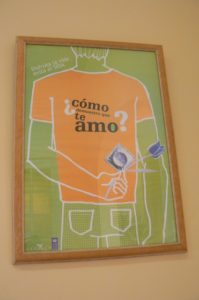 here.
here.
Cesar showed me a brochure that described CENESEX’s mission: to contribute to “the development of a culture of sexuality that is full, pleasurable and responsible, as well as to promote the full exercise of sexual rights.” The center plays a primary role in education concerning contraception, safer sex and HIV prevention. “People do not like to talk about sex here,” said Cesar, “so we have outreach teams who go to educational and public agencies to inform them about the truth and non-truths about sexuality, pregnancy and AIDS.” (photo right CENESEX poster “as I love you’)
CENESEX has also helped gain the passage of a law to provide transgender persons with free sex reassignment surgery and hormone replacement therapy in addition to granting them new legal identification documents with their changed gender–one of the few countries that offers such treatment. A few days’ visit in Havana reveals the frequency and popularity of cross-gender activity here. Effeminate cross-dressers loved to tease and flaunt at others knowing they will not be persecuted. Gay Havana and Cuba today offers new and old lives with caution yet is vibrant in 2016.
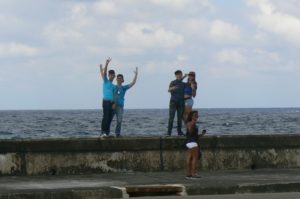 “We are becoming a more tolerant society despite our bad history toward gays. I think this is good and here I am talking to you in public about these things. No one is going to stop you from coming here or stop me from talking to you. Our front door is open. Yes, there is still homophobia and people are criticized and get hit. Things like that change slowly but we are going forward…beside no one would dare vandalize the house of the President’s daughter,” he said with laughter. (photo left, young people on Malecon)
“We are becoming a more tolerant society despite our bad history toward gays. I think this is good and here I am talking to you in public about these things. No one is going to stop you from coming here or stop me from talking to you. Our front door is open. Yes, there is still homophobia and people are criticized and get hit. Things like that change slowly but we are going forward…beside no one would dare vandalize the house of the President’s daughter,” he said with laughter. (photo left, young people on Malecon)
Pepe and Justo– Away From the Public
While in Havana I also saw my old friends Pepe and Justo (photo right) a gay couple for more than forty years and who survived the zealous anti-gay communist persecutions by not living together and having professional careers. As members of the Cuban middle class their lives were constrained by lack of money and resources. They were never outside Cuba mostly because they could not afford the cost and did not think they could get travel visas, given the paranoia of the Fidel regime.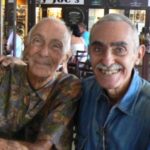
On my recent trip I brought them a gift of a new computer which I easily purchased in a Staples store for less than US$300. They could not have found–nor afforded–such a machine in Havana, although they still do not have direct access to the Internet and must rely on friends with ‘connections’ for e-mail.
As they aged (and for most of their 70+ years) they had full medical coverage from the state system. As I write this, some months later, Justo has sent a message that Pepe passed away last month from COPD, a common affliction of old age. Portions of this story were written before his passing.
Justo is a handsome retired accountant. He learned English as part of his job for a clothing export company over the course of his career. To earn always-needed extra money he has given English lessons to students in a school as well as in private. Pepe’s assigned house was in the suburbs while Justo’s is close to the central district.
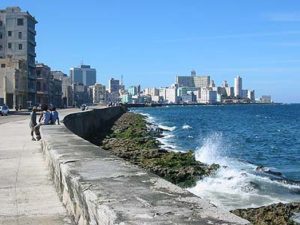 Justo is gentle and considerate man always willing to talk to me both for purposes of practicing his English and to ask questions about the ‘outside’ gay world. When I reminded him my hometown in California was about 20% lesbigay he was amazed, again. I told him that often our city council has one or more openly gay members. On my first visit years ago I gave him copies of The New Yorker and Atlantic Monthly, which he treasured. It’s impossible for him to access such American periodicals in Havana, and if he could they would be too expensive for him. (photo left, view of the Malecon)
Justo is gentle and considerate man always willing to talk to me both for purposes of practicing his English and to ask questions about the ‘outside’ gay world. When I reminded him my hometown in California was about 20% lesbigay he was amazed, again. I told him that often our city council has one or more openly gay members. On my first visit years ago I gave him copies of The New Yorker and Atlantic Monthly, which he treasured. It’s impossible for him to access such American periodicals in Havana, and if he could they would be too expensive for him. (photo left, view of the Malecon)
In his many years he has never seen a gay periodical or a gay video or pictures of any gay pride event until I gave him some. He said that if someone tried to send him any such material, his mail would be pilfered and the contents removed. “They keep it for themselves!”, he said with a sardonic laugh, “they steal everything.”
His life with Pepe was very quiet and safely within the rules. Before Pepe died they would spend several nights together each week. Their ‘gay life’ consisted of a circle of long-time straight and gay friends. “We don’t go out to commercial places (speaking of Pepe in both past and present tense). We like to read and have dinner with friends. I like to cook and talk; we like to visit with people who speak English as well so we can stay fresh with the language,” he described.
As for the standard line that Cuba has for a long time repressed gay people, Justo said, “it is not so hard to be gay here in private. Neither Pepe nor I ever had any trouble with this. We didn’t show it on the street. We didn’t show it at our work. It is not someone else’s business how we had our personal life. That is for us only. 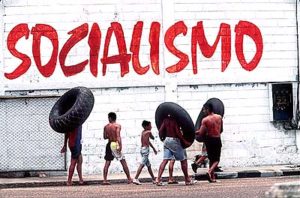 For our neighbors, they know us and they just live their lives and we live ours. Nobody wants trouble, you know; life is already hard here.” (photo right, socialism lives.)
For our neighbors, they know us and they just live their lives and we live ours. Nobody wants trouble, you know; life is already hard here.” (photo right, socialism lives.)
One evening I told him that I had recently been to the ballet with other friends and he was pleasantly surprised. “Oh, yes. We were there too.” I asked him about the gay and lesbian people in the audience and he laughed with acknowledgment. “Of course. Gay people love beautiful things—but so do many good straight people. Some of our best friends are not gay and they have known about us for a long time. But it doesn’t matter. We are friends and that is what’s important.”
As for the Internet, Justo cannot directly access it–hopefully soon. Our first meeting was in the lobby of the 5-star Hotel Telegraphic on the main square in the Habana viejo (old Havana) district so I could show him my web site (GlobalGayz.com). Had he not been with me, he would have been denied access to the three computers provided for hotel guests. He would also have been declined had he wished to rent a room in the fancy hotel. Foreigners only—or privileged Cubans with connections or money. (photo below, children playing)
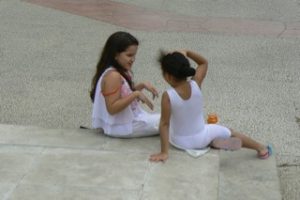 This is not to say Cubans lack any Internet access. Once, I met a ‘student’ (you can never be sure) who showed me a card he bought for a few pesos that allowed him four hours of Intra-net computer time at the post office although his e-mail and browsing is filtered through the government ISP ‘Correocuba’. Obviously this makes it easy for big brother to keep track of wandering minds. But some professional folks such as researchers, doctors, government officials or big businessmen are allowed computers—some socialists are more equal than others it appears. Justo accesses his e-mail through a doctor friend who is engaged in medical research and uses ‘Infomed.sld’ as his mail server.
This is not to say Cubans lack any Internet access. Once, I met a ‘student’ (you can never be sure) who showed me a card he bought for a few pesos that allowed him four hours of Intra-net computer time at the post office although his e-mail and browsing is filtered through the government ISP ‘Correocuba’. Obviously this makes it easy for big brother to keep track of wandering minds. But some professional folks such as researchers, doctors, government officials or big businessmen are allowed computers—some socialists are more equal than others it appears. Justo accesses his e-mail through a doctor friend who is engaged in medical research and uses ‘Infomed.sld’ as his mail server.
Justo was of course aware of the hardships that some gays have faced at the hands of the police. One of their gay friends spent six months in jail before he got bribed out. “I think the young people are more daring now. It is not the same as many years ago when the police would hit you. Now these boys go along the Malecon waterfront promenade or in the Plaza Viejo across from the Telegraph Hotel. It is foolish because they can be arrested for vagrancy. Although we are not totally free to do everything we like the police can be ‘persuaded’ with money to look the other way.” Justo laughed: 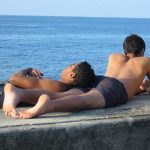 “the money earned from hustling becomes protection from the law.” Still cruisers have to be careful because many police don’t like gays and being in jail is terrible. “But you know the money is good so they do it. In one night, I hear, a handsome pinguero can make more money than a month in a real job. You know how it is; so they take the risk.” (photo right, Malecon waterfront friends).
“the money earned from hustling becomes protection from the law.” Still cruisers have to be careful because many police don’t like gays and being in jail is terrible. “But you know the money is good so they do it. In one night, I hear, a handsome pinguero can make more money than a month in a real job. You know how it is; so they take the risk.” (photo right, Malecon waterfront friends).
That said, on the LGBT website Gay Cuba, there is this announcement: “there is a very vibrant gay scene in Havana with plenty of bars, clubs & gay friendly places filled with the hottest crowd, every single night of the week”. Perhaps a bit exaggerated but it a hopeful statement of the new gay energy emerging in Havana.
I was saddened to hear of Pepe demise. Forty-three years is a long time for love and friendship, but even in Cuba with limited resources “they were good years and I would not have changed that for anything,” said Justo as we parted.
Beyond the Personal
There is a LGBT social ‘scene’ but it’s embedded in the larger social establishment. There is no ‘gay ghetto’ but there is a discreet scene of informal spontaneous movable parties called Fiestas de Diez Pesos. Started in the 1990s they at first developed a clandestine gay scene (known as the ‘ambiente’). Today the parties continue but are less harassed and paranoid. There is usually a mix of Western and Latin music. One can expect to see mostly people hanging out and talking with their friends; nothing wild. They don’t happen in one place so a visitor needs a local friend to find one. Sometimes they happen at private venues and the entry fee is 10 pesos (hence the name) and feature a drag show.
One popular place is Café Fresa y Chocolate (Strawberry and Chocolate) named after the 1993 movie. One visitor noted there were “more lesbian couples than gay men sitting at the tables drinking Crystal beer.” The Paloma Project promotes gender equality’ it is part of the Cuban Institute of Cinematographic Art and Industry. Its leader Lizette Vila has ideas about feminism and LGBT rights, life and community are as progressive and modern as anywhere in Europe. There is an informal ‘gay beach’ named Mi Cayito (Little Cay) a calm and colorful beach lightly populated with LGBT people in various states of dishabille (dressed and undressed), some expressing light affection. In the Plaza de la Revolución there is the Café Cantante that’s gay friendly. Probably the most gay-friendly places in Havana are the public squares where everyone cruises, deliberately or casually, gay and straight: Plaza de Armas, the park across from the Yara Theatre, Plaza Vieja, and Plaza de la Revolución. These are not primarily hunting grounds but since anyone and everyone goes there for different reasons, an inquisitive visitor will likely find something to like.
In May 17th of 2008 the first gay pride parade took place along calle 23; since then this day become the National Day Against Homophobia.
LGBT websites:
Gay Cuba
Gay Travel Guide to Cuba
La Habana.com — lists ten gay and friendly clubs and bars
Also see: Passport magazine January 2016



